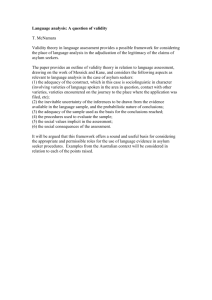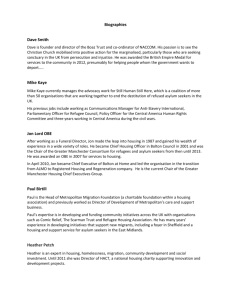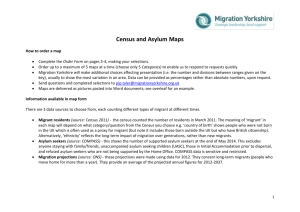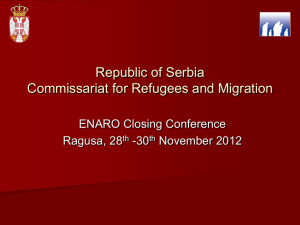Submission to the Cross Departmental Group on Integration
advertisement
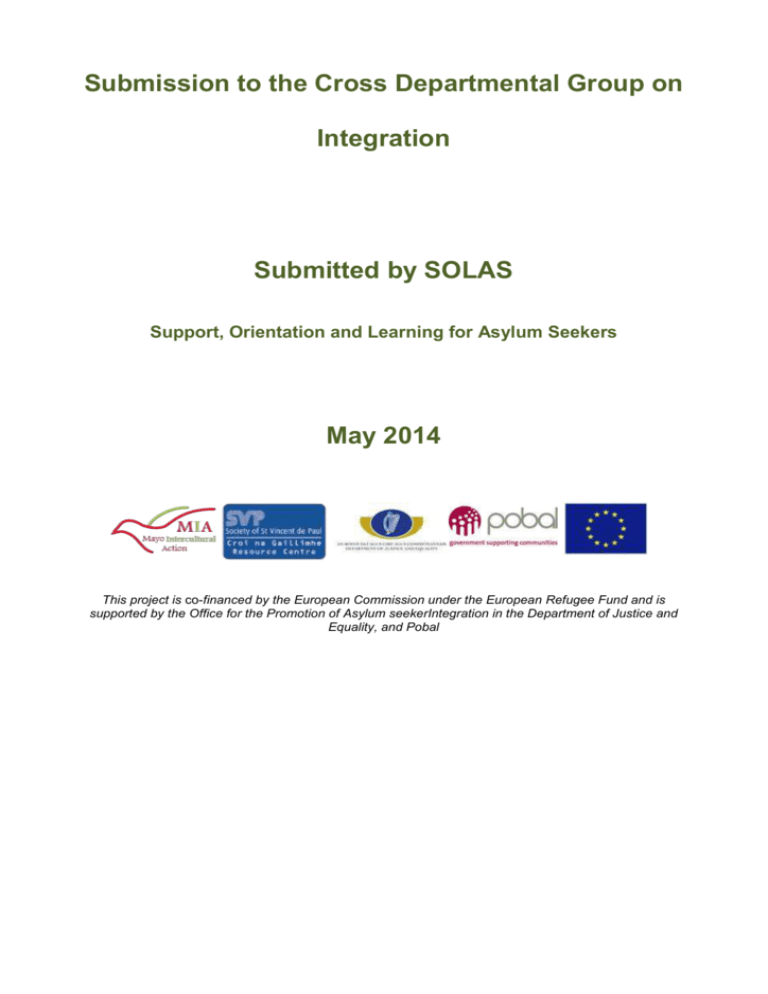
Submission to the Cross Departmental Group on Integration Submitted by SOLAS Support, Orientation and Learning for Asylum Seekers May 2014 This project is co-financed by the European Commission under the European Refugee Fund and is supported by the Office for the Promotion of Asylum seekerIntegration in the Department of Justice and Equality, and Pobal SOLAS – Support, Orientation and Learning for Asylum Seekers SOLAS is a regional partnership project between Mayo Intercultural Action, Croí na Gaillimhe and HSE. Overall Aim: The SOLAS Project seeks to develop and maximise the capacity and potential of those in the asylum process to self advocate and have the capacity to engage with mainstream organsiations and communities through the provision of information resources, skills and confidence. The proposed project will target asylum seekers at particular risk due to their family status, experience of violence, trauma and abuse experienced prior to arrival in Ireland. In addition it will address their isolation from the majority population and their own peers within direct provision centres. Project Aims: To address the isolation of asylum seekers at particular risk due to their family status, experience of violence, trauma and abuse experienced prior to arrival in Ireland. To promote the positive effects of interculturalism and the meaningful participation of asylum seekers, refugees, those in the asylum seekers process and their families in all aspects of the community. To ensure access to information, support and guidance to those in the asylum process where there is currently no direct service provision to direct provision centres. To assist in developing a regional approach to issues facing those seeking Asylum. To pilot a strategy of integrated actions across Mayo and Galway to address the structural barriers preventing asylum seekers from securing information, training and support by simultaneously [2] addressing a number of different needs of the target group. . [3] 1. Specific Issues and Needs of Asylum seekers: 1.1 Isolation o SOLAS has become acutely aware of the isolation of people in the asylum process. The dynamics of isolation has resulted in asylum seekers being systemically left without the supports needed to counter the daily experience of isolation, exclusion and inequality. o Asylum seekers are regularly excluded from identifying as members of Irish society. They experience isolation from each other as well as from the rest of society. This lack of contact with Irish society and thus the opportunity for intercultural contact and exchange does and will in the future manifest itself through: racism and discrimination exacerbated by isolation, ghettoisation and institutionalization resulting from the long term effects of living in direct provision hostels. o In addition the rural setting of Mayo, in particular, its poor public transport system and the population distance from services contribute greatly to this physical, social and cultural isolation. Therefore it is very difficult for asylum seekers to gain social support and validation of their experience. 1.2 Migration Process o Many of the impacts on people in the asylum process and people with refugee status and other asylum seekers develop and/or increase after arrival due to post migration stresses. Their mental and physical health is further affected by social isolation, pre and post migration trauma, cultural shock, language barriers, insecurity due to the asylum process, loss of traditional support structures, separation or death of family members, prolonged [4] uncertainty regarding the outcomes of the asylum process, fear of deportation coupled with a lack of understanding about services, poverty, social exclusion and effects of accommodation and Direct Provision. 1.3 Direct Provision Direct Provision has an adverse effect on the health and well being of people in the asylum process. Asylum seekers are resettled regionally to full-board accommodation, where they are provided with three meals a day and given €19.10 per week for adults and €9.60 per child to meet other basic needs (which has not increased since 1999 despite other social welfare recipients receiving increases). There are a number of aspects of Direct Provision, which are of concern in examining the adverse impact on the health and well being of people in the asylum process, including: o Dietary Needs: The preparation and consumption of food is a key part of everyday independent living for most of the population. However within the direct provision system there are no self-catering facilities and a limited diversity in the range of food on offer. Children’s food is often lacking in the necessary nutritional requirements. If food offered does not agree with residents or is not what they are used to they have no option but to supplement their diet from their weekly allowance of €19.10. o Overcrowding/communal accommodation: There are a number of impacts resulting from this issue ranging from the potential risk to residents of contracting contagious illnesses due to overcrowding and sharing of toilet facilities, lack of hot water for washing etc, to the emotional and psychological impact due to the lack of privacy and dignity afforded to people. [5] o Lack of independent monitoring of direct provision facilities: While monitoring does take place it takes place with advanced warning to the management in question and it is the physical condition of the building that is monitored. o Specialised Training for Staff in Direct Provision Centres is needed. o Access to services: Few statutory services enter direct provision centres and will usually communicate with the management of the centres rather than directly with the residents. o Effects on children’s health and well being: The impacts on children’s health and well being are immeasurable at this stage. Spending part of and in many cases their whole life to date (not knowing any other experience other than direct provision) will undoubtedly store up problems for the future. Observing their parents and friends distress, stress and emotional strain has and will in the future have immense mental and emotional ill effects on these children. The lack of play facilities, lack of freedom to roam, poor nutritional standards and the clear and imposed sense of ‘being different’ from other children in society will contribute to the ill health in the future but also the potential for a deeply stratified and unequal society. o Risk of Abuse: The Direct Provision System exposes children to the risk of abuse and is, in itself, a child abusive structure. o Effects of Poverty: The allowance paid to residents in direct provision has not increased since 2000 despite the increase awarded to all other welfare categories. An example of the effect of poverty generated by such low financial support is that medicines not supported by the medical card and the prescription fee must be paid out of an adult direct provision allowance of only €19.10 per week (indeed most of these medicines cost considerably more that this). As a result a resident is often unable to purchase the necessary medicine leading to further complication in his/her medical condition. [6] o Prohibition on the right to work, education and training: There are many ill effects of forced ‘idleness’ on the wellbeing of people in the asylum process arising from the prohibition on the right to work, education or training including deskilling, diminishing of their sense of self-worth, confidence and capacity to participate in a key part of Irish society’s economic, social and cultural sphere. People in asylum process have contributed significantly to voluntary activity in a climate where there is a lessening of the volunteer capital once available to clubs, society, community and voluntary organisations in Irish society. It provides them with a chance to interact, participate and contribute to Irish society. However, volunteering can also lead to frustration because government agencies fail to acknowledge it as a contribution by asylum seekers to society contrary to government embracing it and social capital as key social ideals. 1.4 Family Reunification: In relation to people with refugee status and asylum seekers in Ireland family reunification within a reasonable timeframe following arrival in Ireland remains a key issue. 1.5 Access to Information and Support o Asylum seekers have considerable difficulties in finding their way around the healthcare, educational, welfare and security services and personal difficulties when there is no adequate language in common between the service provider and the migrant. o Lack of accessible information about rights and entitlements and access to legal supports: o Language, cultural barriers and insensitivity to the cultural backgrounds of service users currently limits or prevents asylum seekers’ access to services. The lack of respect or time provided by some frontline service providers in establishing an understanding of people in [7] the asylum process. For example the western world’s model of health care is the normal process of health care provided however it may not always adhere to the service users own belief system. 1.6 Mental Health Issues People in the asylum process with mental health problems fear being stigmatized and as a result may not seek help. In addition “the disparities in mental health care and services for racial and ethnic minority’s recounts that racial and ethnic minorities…are more likely to receive poor quality and inappropriate mental health care”1. In addition other barriers and problems, which exist, include: o Trauma/Poverty and Social Exclusion: People who seek asylum in Ireland come from a diverse range of countries and cultures. They have often, in their own and in other countries, experienced a wide range of events and trauma that has affected their state of health. Women, men and children may have experienced and/or witnessed torture, sexual violence, violence and political and/or religious oppression and persecution. In addition, they may also have experienced poverty and social exclusion. The impacts of these events and experiences manifest themselves in significant physical ill health and mental health problems including depression, psychological disturbances and or/post traumatic stress syndrome. o Lack of regional and local psychological and counselling support services: In order for people in the asylum process living in the west of Ireland in need of counselling and/or psychological support services which meets their specific needs they have to travel to Dublin. This adds to their distress, has financial implications and means that they are away Brid Clarke, CEO, Mental Health Commission – Addressing the Mental Health Needs of Minority Ethnic Groups and Asylum Seekers in Ireland, National Conference HSE West January 2006. 1 [8] from their families and communities while undergoing treatment. Consistency of treatment is a clear necessity in the treatment of any mental, emotional or physical illness however polices can be short-sighted and regressive. Furthermore while the access to counselling services which exists are extremely limited, there is no dedicated service in existence for asylum seeking children who may have witnessed or experienced trauma prior to their migration to Ireland 1.7 Consequences of the Economic Downturn In addition to the above issues the economic downturn is adding extra pressures to asylum seekers and their families including: o Increased discrimination and racism towards asylum seekers o Further marginalisation of asylum seeker groups within Irish society. o Education spending cuts to special needs assistants and language resource teachers which adversely impact on asylum seeker children. 2. Recommendations Mayo Intercultural Action (SOLAS) welcomes the introduction of a review of integration activities being undertaken by Government and the proposal to introduce a new Integration Strategy which includes consultation with key stakeholders. It is the view of SOLAS that a comprehensive review and consultation process must include the direct input of asylum seekers living in Ireland, therefore SOLAS’s initial recommendation is [9] i. The Cross Departmental Group takes proactive measures to meet with asylum seekers and refugee-led groups to enable their participation in the process of developing a new Integration Strategy. ii. Evaluation at different stages of the implementation process of the Integration strategy needs to be prioritised. Measurement indicators need to be included in any effective policy in order to evaluate its progress and success. iii. Better streamlining and communications between Government Departments and at National and local level. Policies should not contradict each other e.g. Department of Justice and Equality holding onto people’s IDs until their case is determined while Social Welfare and Gardaí at a local level ask people to present IDs. 2.1 Reception and Orientation Phase iv. Implement a comprehensive information and orientation programme for asylum-seekers to be available within one month of their arrival in the State. If adequately resourced to do so this programme could be provided through community groups in collaboration with statutory agencies and would include an introduction to structure of Irish society, Government, state departments and agencies, the Irish political system, Irish culture and society, rights and responsibilities, active citizenship and life skills needed in their new environment. v. Implement a comprehensive mental and physical health assessment for newly arrived asylum-seekers with a referral system to relevant mainstream and specialised services. 2.2 Direct Provision [10] vi. It is an overriding recommendation of SOLAS that the current system of Dispersal and Direct provision for persons engaged in the asylum process/protection determination process should be abolished due to its detrimental impact on the physical, emotional and psychology health and well being of residents and the impact on their fundamental human rights. vii. While the system of Direct Provision continues to operate it should be monitored by an independent body, residents should be consulted by the monitoring body, and that the monitoring body should have the power to make recommendations and impose sanctions on operators of direct provision accommodation centres. In addition this body should be given the task of investigating individual complaints from residents of direct provision accommodation centres. viii. The prohibition on the right to work, participation in training and education for people seeking protection in Ireland should be removed to allow people in the asylum determination process to interact in the major social, economic and cultural sphere of Irish society therefore offsetting negative implications of direct provision on a person’s ability to integrate and participate meaningfully in society. ix. For the period that the system of Direct Provision continues to operates, and following the introduction of an alternative model to support people seeking asylum in Ireland targeted health service initiatives should be implemented to address the mental health needs of people in the asylum process and people with refugee status. To enable equality of access to health services this should be implemented through a dedicated regional and local [11] mainstream psychological service and counselling/support service. These services must be based on the identified and assessed needs of the service users based on direct consultation. x. People seeking protection in Ireland and those engaged in the asylum determination process should be permitted access to social protection/social security supports within a system that does not exclude and discriminate based on their immigration status in the State. xi. Children seeking protection in Ireland and children who are in the State in the care of their parent who is seeking protection should not be prohibited from receiving the universal child benefit payment. xii. The recent 2012 publication by the Irish Refugee council ‘State Sanctioned Poverty and Exclusion’ has evidenced the child protection concerns that arise as a result of the mix of families with single men. Due to the nature of seeking asylum the backgrounds and personal histories of residents cannot be verified at the time of their dispersal to accommodation centres. This puts more vulnerable residents and their children at untold risk of exploitation and harm to their physical and psychological well-being. It is recommended that for the period Direct Provision is in existence families should be catered for in family only accommodation centres. 2.3 Promoting Integration through Legislation and Policy xiii. The Immigration, Residence and Protection Bill and associated policy documents should be enacted and implemented without further delay. [12] xiv. In the course of the enacting of new legislation reforming the current protection application process in Ireland provisions should be for people already engaged in applications with the Department of Justice and Equality. xv. In the course of drafting new legislation and associated policy documents consideration should be given to introducing an appropriate remedy for asylum seekers in the State who have become undocumented to have the opportunity to access a scheme to regularise their immigration status. xvi. The presence of family in a migrant’s host country and the process of family reunification is a key factor in promoting integration for asylum seekers. Rights to family reunification for refugees and Irish citizens should be established on a legislative basis. xvii. The Integration Strategy should include recommendations for the updating and development of national strategies such as the National Action Plan Against Racism, and for the inclusion of asylum seekers in the National Action Plan for Social Inclusion. xviii. The remit of Office of the Ombudsman should be expanded to include areas relating to immigration, asylum/protection determination process and naturalisation. 2.4 Access to Information and Services [13] xix. A comprehensive translation and interpretation service should be available for asylum seekers accessing statutory services, information about the availability of an interpreting service and the right to access an interpreting service should easily available and accessible in various languages in all state agencies and offices offering a service to the public. xx. The strategy should recommend and implement training in cultural competence, anti racism and diversity for statutory service providers and other service providers engaging with the public. xxi. Professional body to oversee/ regulate the interpreting /translation services is needed. xxii. Specialised supports such as counselling provided by Spirasi, Rape Crisis Centres is under resourced and very difficult for people in rural locations to access. More funding and expanded services needed. 2.5 Participation and Integration i. Asylum seekers should be involved in the planning, design and delivery of services, ranging from services affecting an individual, to inclusion in the planning and delivery of wider services. For example Interagency Migrant Forums should be established at County level to analyse, plan and respond effectively and culturally appropriately to the needs of asylum seekers living in the county. The Interagency Migrant Forum could be within the Local Authority structure under the Local Community Development Council. Asylum seekers are under-represented on Local Community Development Councils and other fora and steps must be taken to ensure their participation. ii. The Integration Strategy should recommend the building of community infrastructure in order to enable asylum seekers to come together through the provision of meeting space, [14] supporting the organisational development of groups and the provision of leadership training in order that they can represent themselves and that their own voices are heard. iii. The Integration Strategy should ensure the building of alliances and partnerships between migrant-led organisations, community/voluntary group, NGOs working with asylum seeker and statutory services. 2.6 Funding iv. The Integration Strategy should ensure that consistent and secure funding is made available to implement recommendations from the Strategy to maintain the effectiveness of the strategy in promoting integration. v. The Integration Strategy should ensure that legal services, information and advocacy services are adequately resourced to ensure asylum seekers can realise their rights following any legislative changes. vi. The Integration Strategy should ensure the provision of more consistent, long term funding and resources for community services and support systems delivered by community and voluntary groups, charities and NGOs that have built the trust, confidence and skills of asylum seekers. Funding could be allocated through a central agency or through the Local Authority structures. [15] vii. Funding should be made available to support community based and voluntary organisations and groups to carry out outreach work and consultation asylum seekers. It must support them in building trust with asylum seeker communities and assist these service users in identifying their own issues and needs. This must be followed by the building of capacity, collective action, support and influencing of policy and practice which best meets the needs of asylum seekers. 2.7 Positive Action: viii. The Strategy should recommend the accommodation of the transfer of qualifications (from migrant’s country of origin to the Irish education system) in a user-friendly manner and accomplished in a short time frame. For example, a person who has already undergone a four-year period of study in his or her own country should not be expected to undergo it again within the Irish system when a short refresher or progression programme would suffice. ix. The strategy should recommend and implement training in cultural competence, anti racism/anti discrimination and diversity for members of the majority population and in particular for staff of direct provision centres.Promoting integration is not solely the responsibility of asylum seekers, without majority population understanding of migration, cultural difference and the impact of discrimination meaningful integration will not occur. 3. Conclusion In conclusion the strength of any strategy is the ability to establish mechanism to review, monitor and evaluate it comprehensively; including providing clear and uniform process that can be monitored and evaluated. Therefore the Strategy should: [16] Ensure implementation strategies. Review the Strategy in each county. Ensure the same method of review is used in each region. Ensure opportunities to identify problems and make appropriate amendments are built into strategy. SOLAS Registered Charity CHY 17936 [17]
